Russian humor – What do Russians laugh about?
Today’s podcast is unusually long. It’s dedicated to the Russian humor. This time I’ll tell you about the humor that I grew up on and had the pleasure to observe during my life. The episode includes a lot of Russian jokes and anecdotes, as well as the links to the Russian comedies and comedy shows. Hope you enjoy it!
(The titles are added for the convenience of reading and not voiced in the audio.)
Всем приве́т.
Hello everybody.
Сего́дня мы поговори́м о ру́сском ю́море. Я не бу́ду пыта́ться обрисова́ть каку́ю-то глоба́льную карти́ну а-ля “осо́бенности ру́сского ю́мора”, а скоре́е расскажу́ вам о том ю́море, на кото́ром я, роди́вшись в СССР в год Олимпиа́ды, вы́росла и кото́рый име́ла удово́льствие наблюда́ть в тече́ние мое́й жи́зни.
Today we will talk about the Russian humor. I’m not going to try describe some global picture à la “the peculiarities of the Russian humor”, but rather tell you about the humor on which I, being born in the USSR in the year of the Olympiad, grew up, and which I had the pleasure of observing during my life.
А начнём мы с лингвисти́ческой спра́вки.
And we begin with a linguistic reference.
Не́которые исто́чники утвержда́ют, что ру́сское сло́во смех берёт своё нача́ло от глаго́ла сметь. По-ру́сски смеётся тот, кто посме́л – сме́лый челове́к, преодолева́ющий сме́хом непра́вду, го́ре и́ли страх. Ины́ми слова́ми, ру́сский смех – э́то осно́ва национа́льного му́жества и ве́ры в свои́ си́лы.
Some sources claim that the Russian word “смех” (laughter) takes its beginning from the verb “сметь” (to dare). The one who dares, laughs the Russian way: it’s a brave person that overcomes lies, sorrow or fear with his laughter. In other words, the Russian laughter is the basis of national courage and faith.
И в са́мом де́ле, спосо́бность смея́ться в тру́дные мину́ты называ́ют одно́й из причи́н национа́льной сто́йкости ру́сских. До́лгие го́ды невзго́д и лише́ний научи́ли ру́сских люде́й смея́ться над са́мыми, каза́лось бы, безвы́ходными ситуа́циями. С не ме́ньшим удово́льствием мы смеёмся и над сами́ми собо́й.
Indeed, the ability to laugh at difficult times is called one of the reasons for the national resistance of Russians. Long years of adversity and deprivation have taught the Russian people to laugh in seemingly hopeless situations. With not less pleasure we laugh at ourselves too.
Anecdotes – most popular form of the Russian humor
Са́мый популя́рный форма́т ю́мора в Росси́и – э́то, коне́чно, анекдо́ты – коро́ткие смешны́е исто́рии. Хара́ктер анекдо́тов ча́ще всего́ социа́льный и ча́сто обусло́влен внутригосуда́рственными причи́нами.
The most popular form of the Russian humor is, of course, the anecdotes – short funny stories. The character of anecdotes is most often social and often related to the situation in the state.
Political anecdotes
К приме́ру, в ста́линскую эпо́ху основно́й те́мой анекдо́тов служи́ли ма́ссовые репре́ссии:
For example, in the Stalin epoch, the main topic of anecdotes were mass repressions:
1937-й год. Муж с жено́й чу́тко спят в свое́й кварти́ре. Вдруг среди́ но́чи – шум и то́пот ног на ле́стнице. Ре́зкий звоно́к в дверь, сопровожда́емый гро́мким сту́ком. Ни жив, ни мёртв, муж пошёл открыва́ть. Че́рез мину́ту он возвраща́ется:
– Не волну́йся, – говори́т он, – э́то всего́ лишь пожа́р, наш дом гори́т.
Year 1937. Husband and wife are sleeping sensitively in their apartment. Suddenly, in the middle of the night they hear noise and sound of steps from the staircase. Somebody sharply rang the bell at the door and accompanied it by a loud knock. Neither alive nor dead, husband went to open. In a minute, he comes back:
– Don’t worry, – he says, – it’s just a fire, our house is on fire.
Полити́ческие анекдо́ты бы́ли о́чень популя́рными на протяже́нии всего́ существова́ния СССР. За расска́з тако́го анекдо́та могли́ и посади́ть, а поэ́тому расска́зывали их шёпотом и то́лько в кругу́ люде́й, кото́рым доверя́ли безогово́рочно.
Political anecdotes were very popular throughout the entire existence of the USSR. One could be thrown in jail for telling such anecdotes, therefore they were told in whispers and only in a circle of people that are trusted unconditionally.
– Пра́вда ли, что при коммуни́зме проду́кты мо́жно бу́дет зака́зывать по телефо́ну?
– Пра́вда. Но выдава́ть их бу́дут по телеви́зору.
– Is it true that under the communism we’ll be able to order products over the phone?
– True. But they will be distributed over the television.
В на́ши дни полити́ческая ситуа́ция в стране́ в ко́рне измени́лась, но мно́гие из ста́рых сове́тских полити́ческих анекдо́тов до сих пор вызыва́ют улы́бки и смех, осо́бенно у тех, кто пережи́л ту эпо́ху. Сего́дняшние же полити́ческие анекдо́ты стро́ятся в основно́м вокру́г совреме́нных поли́тиков, корру́пции и бесконтро́льного поведе́ния депута́тов. Наприме́р:
In our days, the political situation in the country has fundamentally changed, but many of the old Soviet political anecdotes are still causing smiles and laughter, especially for those who had lived through those times. Today’s political anecdotes are built mostly around the modern politicians, corruption and uncontrollable behavior of deputies. For example:
У губерна́тора пробле́ма: где взять асфа́льт для доро́г, по кото́рым е́здить на Порше́, кото́рый по накладны́м и есть асфа́льт.
Governor’s problem: where to get the asphalt for the roads on which he wants to drive his Porsche, when the Porsche itself is listed in the invoices as asphalt.
У́ровень мышле́ния на́ших депута́тов тако́в, что е́сли депута́т во вто́рник поскользнётся на льду и слома́ет ру́ку, то он бу́дет боро́ться не с гололёдом, а со вто́рниками.
The level of thinking of our deputies is such that if on Tuesday a deputy slips on ice and fractures his arm, he will fight not against the ice-crusted grounds but against the Tuesdays.
Е́сли бы на вы́борах голосова́ли за то, кого́ из депута́тов посади́ть, то я́вка избира́телей была́ бы близка́ к 100%.
If at the elections they voted for which of the deputies to put to jail, then voter turnout would be close to 100%.
Jokes based on the game of words
Ру́сский язы́к, бога́тый на сино́нимы и омо́нимы, позволя́ет ру́сским игра́ть со слова́ми и вызыва́ть необы́чные ассоциа́ции. Шу́тки, постро́енные на игре́ слов, обы́чно осо́бенно сло́жно перевести́, так как они́, как никаки́е други́е, тре́буют зна́ния ру́сского языка́. Наприме́р:
The Russian language, rich in synonyms and homonyms, allows Russians to play with words and evoke unusual associations. The jokes that are built on the game of words are usually especially hard to translate, since they, like nothing else, require knowledge of the Russian language. For example:
Слу́шай, да ты совсе́м не́рвный стал! Тебе́ э́то… успоко́иться на́до. Мо́жет тебе́ съе́здить куда́? В че́люсть, наприме́р…
Listen, you have become a true nerve! You know what you need? To calm down. Maybe go somewhere? In the jaw, for example …
Т.е. друг предлага́ет съе́здить куда́-нибудь, вро́де как отдохну́ть, но неожи́данно ока́зывается, что он име́л ввиду́ про́сто “дать по мо́рде” (съе́здить в че́люсть – зна́чить уда́рить в че́люсть).
I.e. a friend offers to go somewhere, kind of for a holiday, but unexpectedly it turns out that he had in mind simply “to punch in the face” (“съездить в челюсть” means to hit in the jaw).
Anecdotes about Vovochka
Больша́я часть ру́сских анекдо́тов име́ют свои́х персона́жей с определёнными хара́ктерами. Наприме́р, Вовочка, кото́рый у́чится в шко́ле. Вовочка отно́сится к жи́зни по-наи́вному и в то же вре́мя цини́чно. Э́то позволя́ет ему́ находи́ть несура́зности в поведе́нии взро́слых и не стесня́ться им на их ука́зывать. Отку́да пошло́ называ́ть э́того геро́я и́менно Во́вочка, сказа́ть сло́жно, но скоре́е всего́ потому́, что э́то и́мя бы́ло наболее популя́рно в нача́ле 20-го столе́тия, а та́кже Во́вой зва́ли Ле́нина.
Big part of the Russian jokes have their own characters with certain personalities. For example, Vovochka, who goes to school. Vovochka refers to life in a naive and at the same time cynical way. This allows him to find unnaturalness and irrationality in the behavior of adults and do not hesitate to point at them. It is hard to tell where the name Vovochka comes from, but most likely, because it was the most popular name at the beginning of the 20th century, and also Lenin had the name Vova.
Приме́ры анекдо́тов про Вовочку:
Some examples of the anecdotes about Vovochka:
Учи́тель:
— Наде́юсь, Вовочка, я не уви́жу, как ты сего́дня спи́сываешь контро́льную?
— Я то́же на э́то наде́юсь.
Teacher:
– Vovochka, I hope I will not see you copying somebody’s test today?
– I hope so too.
Уро́к «Осно́вы правосла́вной культу́ры». Учи́тельница:
— И по́мните, де́ти! Те, кто бу́дет учи́ться на «4» и «5», попаду́т в рай. А те, кто бу́дет учи́ться на «2» и «3», — в ад!
Вовочка с за́дней па́рты:
— Мариванна, а что, зако́нчить шко́лу живы́м ника́к?…
The lesson “The foundations of Orthodoxy culture”. Teacher:
– And remember, children! Those who get “4” and “5” (high grades) will go to heaven. And those who get “2” and “3” (low grades) – to hell!
Vovochka from the back of the classroom:
– Marivanna, what, there is no chance to graduate alive at all?
— Вовочка, ты в како́м кла́ссе у́чишься?
— В эконо́м кла́ссе.
— Как э́то?
— В на́шем кла́ссе у всех простыe роди́тели.
– Vovochka, what class do you study in?
– Economy (budget) class.
– How is that?
– In our class, everybody has simple parents.
Роди́тели у Вовочки, на́до сказа́ть, его́ досто́йные:
The Vovochka’s parents, by the way, are totally worth his son:
Вовочка прихо́дит к отцу́:
— Па́па, я опя́ть в шко́ле стекло́ разби́л.
— Блин, у вас не шко́ла, а оранжере́я кака́я-то!
Vovochka comes to his father:
– Dad, I broke a window at school again.
– Damn, yours is not a school, it’s a glass greenhouse!
Anecdotes about a Chukcha
Росси́я – многонациона́льная страна́, и всегда́ найдётся сосе́д, над кото́рым мо́жно посмея́ться. Дово́льно ча́сто в анекдо́тах ру́сские смею́тся над чу́кчами, украи́нцы над молдава́нами, и так да́лее. Остано́вимся, как приме́р, на чу́кчах. Чу́кчи – э́то о́чень немногочи́сленный коренно́й наро́д кра́йнего северо-восто́ка Евра́зии, разбро́санный по огро́мной террито́рии. Чи́сленность чу́кчей по да́нным всеросси́йской пе́реписи населе́ния 2010 го́да — всего́ 15908 челове́к.
Russia is a multinational country, and there will always be a neighbor at which one can laugh. Often in the anecdotes, the Russians are laughing at the Chukchi, the Ukrainians at the Moldavians, and so on. Let us stop, as an example, on Chukchi. Chukchi is a very small number of the indigenous people of the extreme north-east of Eurasia, spread out over a vast territory. The number of Chukchi according to the data of the All-Russian census of 2010 is only 15908 people.
В анекдо́тах чу́кча отлича́ется экстрема́льной наи́вностью и простото́й, воспи́танной тяжёлыми усло́виями жи́зни. Э́то позволя́ет ему́ попада́ть в са́мые стра́нные ситуа́ции и говори́ть смешны́е и неожи́данные ве́щи. Вот, наприме́р, па́ра анекдо́тов про чу́кчу:
In anecdotes, Chukcha is notable for his extreme naivete and simplicity which are brought about by difficult life conditions. This allows him to get into the most strange situations and say funny and unexpected things. Here, for example, a couple of anecdotes about Chukcha:
У мои́х друзе́й есть знако́мый чу́кча. Он хорошо́ поёт. Что ви́дит – о том и поёт… Но в ба́ню с ним никто́ не хо́дит.
My friends have Chukcha friend. He sings very well. He sings about what he sees… But nobody wants to go with him to the bath house (sauna).
Жени́лся чу́кча на ру́сской. Че́рез како́е-то вре́мя спра́шивают у него́:
– Ну что, как жена́ но́вая?
– Хорошо́, – говори́т чу́кча, – то́лько гря́зная о́чень, ка́ждый день мо́ется.
Chukcha married a Russian girl. After some time people ask him:
– So, how is your new wife?
– Good, – says Chukcha, – only she is very dirty, washes every day.
Anecdotes about new Russians
По́сле распа́да сою́за в Росси́и появи́лся но́вый социа́льный слой – но́вые ру́сские. Э́ти това́рищи умудри́лись сколоти́ть состоя́ния, как пра́вило, сомни́тельным и незако́нным путём, в са́мое непросто́е (е́сли счита́ть по́сле второ́й мирово́й войны́ и Стали́на) для ру́сских люде́й вре́мя. Зачасту́ю они́ облада́ли дово́льно сре́дним у́ровнем интелле́кта и, несмотря́ на своё состоя́ние, продолжа́ли испо́льзовать мане́ры и ле́ксику социа́льных слоёв населе́ния, из кото́рых вы́шли. Неудиви́тельно, что дово́льно ско́ро они́ ста́ли популя́рными персона́жами анекдо́тов:
After the USSR fell apart, a new social layer appeared in Russia – new Russians. These comrades have managed to make a fortune, mostly in a dodgy and unlawful way, in a very difficult times for the Russian people (if you count after the second world war and Stalin). Often, they had a rather medium level of intellect and, in spite of their richness, continued to use manners and vocabulary of the social layers of the population from which they came from. It is not surprising that soon they became popular characters of anecdotes:
Но́вый ру́сский, бы́вший дво́ечник, расска́зывает своему́ шко́льному прия́телю (бы́вшему отли́чнику, а тепе́рь е́ле сводя́щему концы́ с конца́ми), как он де́лает би́знес:
– Вот возьмём сигаре́ты. Там покупа́ем за 1 до́ллар, а тут продаём по 3 до́ллара. Вот так на 2 проце́нта и живём.
A new Russian, who studied at school very badly, tells his school friend (who studied very well but now is struggling to make the ends meet), as he does bisness:
– Take, for example, the cigarettes. There we buy for 1 dollar, and here we sell for 3 dollars. So end up living on the 2% that’s left.
Оди́н мужи́к друго́му:
– Я тепе́рь в систе́ме безопа́сности своего́ ше́фа рабо́таю. Ве́чером гримиру́юсь под ше́фа, сажу́сь на его́ инома́рку и е́ду к нему́ домо́й. А он — сза́ди, на “Запоро́жце“.
– Так э́то, наве́рное, опа́сно?
– Ну да. Вчера́, наприме́р, мы о́ба ухитри́лись в одну́ и ту же круту́ю инома́рку въе́хать. Так я па́льцы ве́ером и да́льше покати́л, а ше́фа вы́тащили из “За́пора” и до́лго би́ли мо́рду.
A man is telling his friend:
– Now, I’m working in the security department for my boss. At night, I put make up to look like my boss, sit in his expensive (foreign) car and drive to his house. And he is driving behind in the “Zaporozhets“.
– But it’s probably dangerous?
– Well, yes. Yesterday, for example, we had an accident – both hit the same expensive car. So I “put my fingers into a fan” and drove away, but my boss was pulled out of the “Zaporozhets” and punched in the face for a while.
Па́льцы ве́ером – весьма́ изве́стный жест, когда́ мизи́нец и указа́тельный па́лец выставля́ют вперёд, а оста́вшиеся па́льцы прижа́ты к ладо́ни. Жест был позаи́мствован но́выми ру́сскими у кримина́льных слоёв и предназнача́лся для обозначе́ния превосхо́дства над собесе́дником. В хо́ду та́кже те́рмины на па́льцах и́ли распальцо́вка, обознача́ющие то же са́мое.
“Fingers like a fan” is a very well-known gesture when the little and the pointing finger are put forward, and the remaining fingers are pressed to the palm. The gesture was taken by the new Russians from the criminal public and was intended to indicate superiority over the interlocutor. There are also the terms “on the fingers” and “raspaltsovka”, meaning the same thing.

Demotivators
Одна́ко не анекдо́том еди́ным жив ру́сский ю́мор. Ещё одно́ направле́ние ру́сского ю́мора, возни́кшего в эпо́ху ра́ннего интерне́та, э́то демотива́торы.
However, not only anecdotes feed the Russian humor. Another direction of the Russian humor which appeared in the epoch of the early Internet is “demotivators”.
Демотива́тор – э́то карти́нка, помещённая в чёрную ра́мку, к кото́рой доба́влена смешна́я на́дпись. Демотива́торы ча́сто передаю́т атмосфе́ру обречённости и бессмы́сленности челове́ческих уси́лий, отку́да и пошло́ их назва́ние. Одна́ко со вре́менем доба́вилось и большо́е число́ позити́вных и мотиви́рующих демотива́торов.
A demotivator is an image placed in a black frame to which a funny inscription is added. Demotivators often convey the atmosphere of the fatality and senselessness of human efforts, that’s why the are called like that. However, a great number of positive and motivating demotivators were added over time.
Предлага́ю ва́шему внима́нию небольшу́ю их подбо́рку. Е́сли вы одновреме́нно с чте́нием слу́шаете а́удио, предлага́ю поста́вить его́ на па́узу и оцени́ть ю́мор:
I offer to your attention a small selection of them. If you are listening to audio at the same time as reading this, I suggest you pause the audio and appreciate the humor:
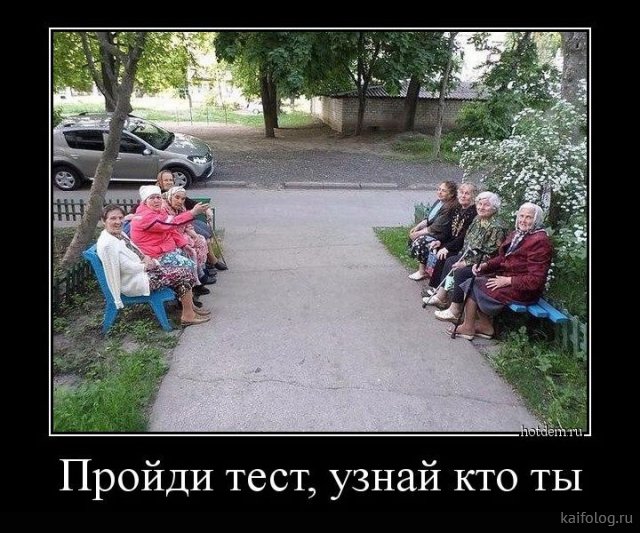
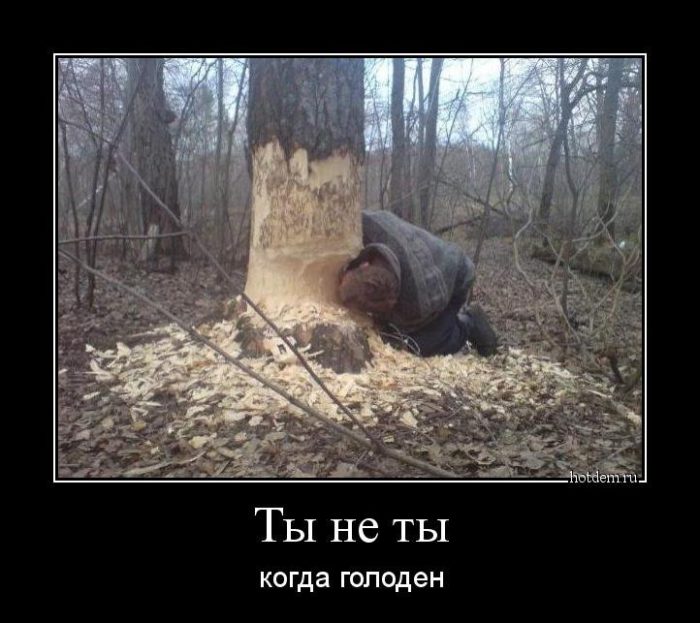

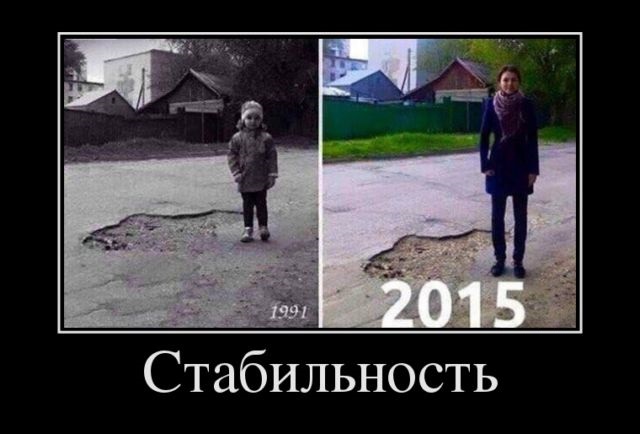
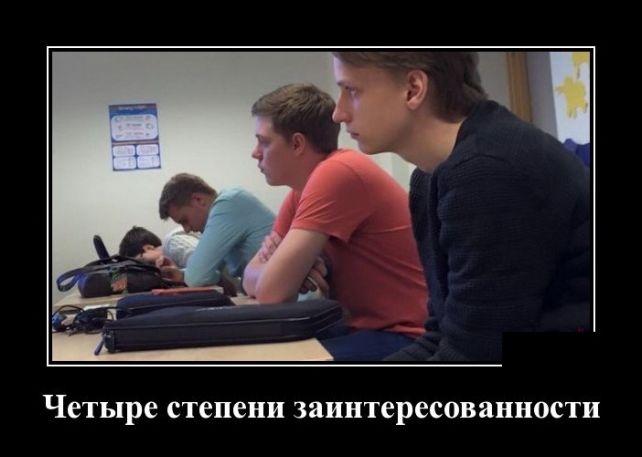
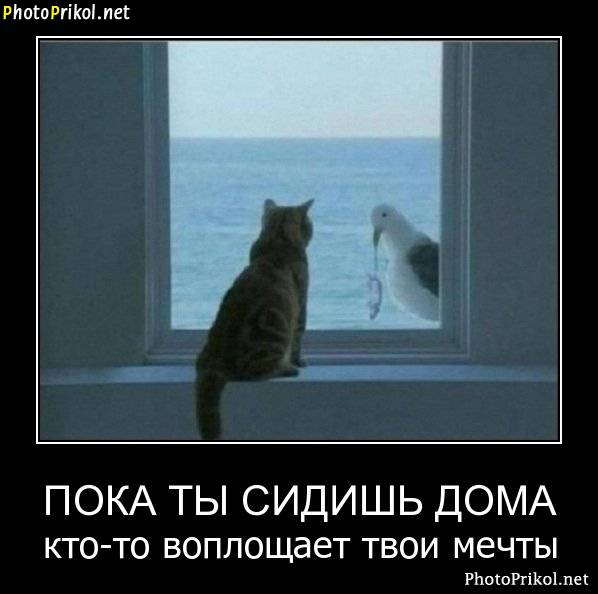
Ду́маю, что на бо́льшей ча́сти демотива́торов ю́мор поня́тен, кро́ме, возмо́жно пе́рвого. Я не уве́рена, что феноме́н, изображённый на пе́рвой карти́нке прису́тствует у други́х наро́дов… хотя́ почему́ бы и нет. В любо́м слу́чае, поясня́ю: на карти́нке стару́шки – ба́бушки. В класси́ческом ру́сском дворе́ э́ти ба́бушки сидя́т це́лыми дня́ми на скаме́йке, спле́тничают и обсужда́ют проходя́щих ми́мо. Таки́м о́бразом проходя́ ми́мо них мо́жно услы́шать о себе́ ма́ссу интере́сного.
I think that in most of the demotivators above the humor is clear, except the first one, probably. I am not sure that the phenomenon depicted in the first picture exists in other nations… although why not. In any case, I explain: in the picture you see the old women – бабушки (grandmothers). In the classic Russian courtyard, these бабушки are sitting all day long on a bench, gossiping and discussing everybody who passes by. Thus, when passing by them you can hear a lot of interesting things about yourself.
Russian humor in the cinema
Кино́, осо́бенно ста́рые сове́тские фи́льмы, э́то огро́мный исто́чник искромётных шу́ток, иро́нии и цита́т, повторя́емых всем наро́дом. Наприме́р, кла́ссика сове́тской коме́дии – “Ива́н Васи́льевич меня́ет профе́ссию” – буква́льно расхва́тан на цита́ты.
The cinema, especially the old Soviet films, is a huge source of sparkling jokes, irony and quotes that are repeated by all people. For example, a classic of the Soviet comedy – “Ivan Vasilyevich changes his profession” is literally “torn apart” on quotes.
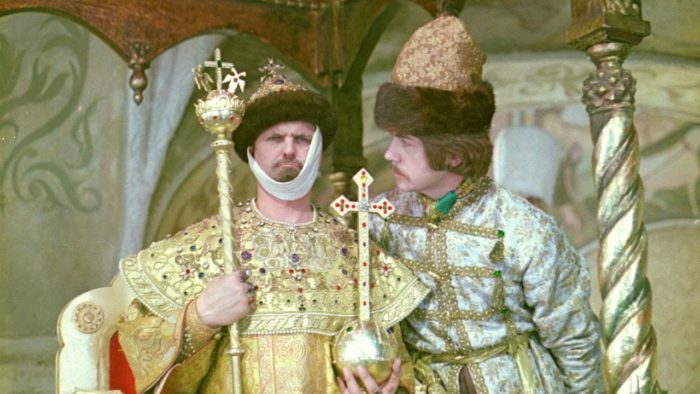
Та́кже рекоменду́ю посмотре́ть таки́е люби́мые все́ми ру́сскими фи́льмы как “Любо́вь и го́луби“, “Опера́ция Ы и други́е приключе́ния Шурика“, “Кавка́зская пле́нница“, “Служе́бный рома́н“, “Покровские воро́та“, “Соба́чье се́рдце“, “Бриллиа́нтовая рука́” и “Иро́ния судьбы́ и́ли с лёгким па́ром” (про кото́рый я уже́ ка́к-то расска́зывала).
I also recommend you to watch such loved by Russians movies as “Love and pigeons”, “Operation Y and Other Shurik’s Adventures”, “Caucasian prisoner”, “Office Romance”, “Pokrovskie gates”, “Dog’s Heart”, “Diamond Arm” and “Irony of Fate or Enjoy Your Bath” (about which I already talked).
Коне́чно, что́бы по́лностью оцени́ть по досто́инству цита́ты из фи́льмов, на́до бы посмотре́ть са́ми фи́льмы. Но я бы всё равно́ хоте́ла предложи́ть ва́шему внима́нию не́сколько заба́вных и остроу́мных цита́т:
Of course, in order to fully appreciate the quotes from the movies one should watch the movies themselves. But I would still like to offer to your attention a few amusing and witty quotes:
Когда́ вы говори́те, Ива́н Васи́льевич, впечатле́ние тако́е, что вы бре́дите. (Ива́н Васи́льевич меня́ет профе́ссию)
When you speak, Ivan Vasilyevich, I have an impression that you are delirious. (Ivan Vasilyevich changes his profession)
Иногда́ таку́ю глу́пость услы́шишь – а ока́зывается, то́чка зре́ния! (Москва́ слеза́м не ве́рит)
Sometimes you hear such a stupid thing – but turns out it’s a point of view! (Moscow does not believe in tears)
Не учи́те меня́ жить, лу́чше помоги́те материа́льно! (Москва́ слеза́м не ве́рит)
Do not teach me how to live, better help me with money! (Moscow does not believe in tears)
Я по́нял, в чём ва́ша беда́. Вы сли́шком серьёзны. Все глу́пости на земле́ соверша́лись и́менно с э́тим выраже́нием лица́. (Тот са́мый Мюнхаузен)
I realized what your problem is. You are too serious. All the absurdities on earth were made with this expression on the face. (That Munchausen)
У вас потряса́ющая профе́ссия: вы занима́етесь тем, чего́ нет. (Гара́ж)
You have an amazing profession: you are dealing with something that does not exist. (Garage)
Те мои́ пацие́нты, кото́рых я заставля́л чита́ть «Пра́вду», теря́ли в ве́се. (Соба́чье се́рдце)
Those my patients, whom I forced to read Pravda, lost in weight. (Dog’s heart)
Мы вас лю́бим… в глубине́ души́. Где́-то о́чень глубоко́. (Служе́бный рома́н)
We love you… deep down in the soul. Somewhere very deep. (Office romance)
Russian humor on TV
Дава́йте перемести́мся с экра́нов кинотеа́тров на телеви́дение…
Let’s move from the cinema screens to TV…
Yeralash
Одно́й из люби́мых мной переда́ч, когда́ я учи́лась в мла́дших кла́ссах шко́лы, был Ерала́ш. Ерала́ш – э́то сове́тский и поздне́е росси́йский юмористи́ческий киножурна́л для дете́й. Пе́рвые вы́пуски журна́ла вы́шли в 1974 году. Снача́ла его́ пока́зывали то́лько в кинотеа́трах, но вско́ре журна́л перее́хал на телеви́дение.
One of my favorite shows when I was in junior school was Yeralash. Yeralash is a Soviet and later Russian humorous newsreel for children. The first episodes of the newsreel came out in 1974. At first, it was shown only in cinemas, but soon the newsreel moved to television.

Мно́гие спо́рят, что тепе́решний Ерала́ш не тако́й, каки́м он был во времена́ СССР, что тепе́рь, когда́ у ка́ждого ребёнка, снима́ющегося в журна́ле, есть свой аге́нт, э́то бо́льше напомина́ет шоу-би́знес. Я не бу́ду присоединя́ться к спо́ру, а про́сто предлага́ю вам посмотре́ть вы́пуски Ерала́ша из ра́зных времён и реши́ть сами́м (ссы́лка). Е́сли у вас есть де́ти, изуча́ющие ру́сский язы́к, Ерала́ш бу́дет хоро́шим материа́лом для пра́ктики.
Many argue that nowadays Yeralash is not the same as it was in Soviet times. That now, when every child who is in the case of the newsreel has his own agent, it reminds show business more than anything else. I will not join this dispute but simply offer you to watch some Yeralash episodes from different times and decide for yourself (link). If you have children studying the Russian language, Yeralash will be a good material for practice.
KVN
В 1961 году на экра́нах телеви́зоров сове́тские лю́ди уви́дели пе́рвые вы́пуски КВН, т.е. Клу́ба Весёлых и Нахо́дчивых – телевизио́нные юмористи́ческие и́гры, в кото́рых кома́нды разли́чных коллекти́вов (уче́бных заведе́ний, ву́зов, предприя́тий, городо́в и т.д.) соревнова́лись в юмористи́ческих отве́тах на за́данные вопро́сы, импровиза́циях на за́данные те́мы, разы́грывании зара́нее загото́вленных сце́н и т. д.
In 1961, on the screens of television sets, the Soviet people saw the first editions of KVN, i.e. Club of Joyful and Resourceful ones, where the teams of various collectives (educational institutions, universities, enterprises, cities, etc.) competed in humorous responses to the questions asked, improvisations to the set topics, performing the scenes prepared in advance, etc.
КВН по́льзовался огро́мной популя́рностью, в шко́лах и други́х уче́бных заведе́ниях организо́вывались со́бственные и́гры по образцу́ КВН. Отбо́рочные ту́ры проходи́ли по всей стране́, а на телеви́дение попада́ли то́лько лу́чшие из лу́чших.
KVN was very very popular, in schools and other educational institutions their own games based on the model of KVN were organized. The qualifying rounds were happening all over the country, and only the best of the best made it to TV.
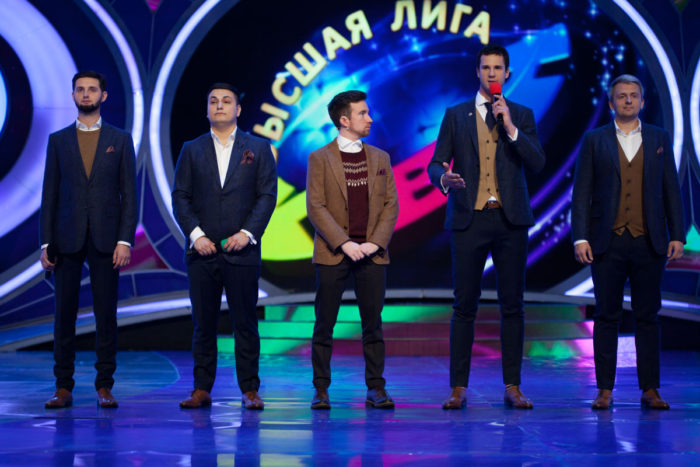
Переда́ча закры́лась в 1972 году, но возобнови́лась в 1986 и продолжа́ется до сих пор (ссы́лка на официа́льный кана́л КВН).
The show was closed in 1972, but resumed in 1986 and continues to this day (link to the official channel).
Мно́гие КВН-щики станови́лись и стано́вятся изве́стными по оконча́нии свое́й карье́ры в КВН, мно́гие из них продолжа́ют свой путь на телеви́дении, создава́я други́е юмористи́ческие шоу.
Many KVN players used to become and still become famous at the end of their careers in KVN, many of them continue their way on television creating other humorous shows.
Comedy Club
Одно́ из таки́х шоу, со́зданное вы́ходцами из КВН, э́то Comedy Club. Comedy Club впервы́е вы́шел в эфи́р в 2004 году́. Э́то абсолю́тный проду́кт совреме́нности, практи́чески со́зданный по за́падным станда́ртам.
One of these shows created by the ex-KVN-players is Comedy Club. Comedy Club was first aired in 2004. This is an absolute product of modern times, practically created by Western standards.

Мно́гие жа́луются, что шоу сли́шком комерциализи́ровано, а шу́тки ча́сто соде́ржат непристо́йности и туале́тный ю́мор. К сожале́нию, я не могу́ с э́тим не согласи́ться, хотя́ бы́ли у ребя́т и смешны́е шу́тки, осо́бенно на ра́нних эта́пах шоу. Предлага́ю вам посмотре́ть не́сколько вы́пусков и суди́ть сами́м (ссы́лка на официа́льный кана́л).
Many complain that the show is too commercialized and the jokes often contain obscenities and “toilet humor”. Unfortunately, I can not disagree with that, although the guys used to have funny jokes, especially on early stages of the show. I offer you to watch a few episodes and be the judge of it yourself (link to the official channel).
Russian humor not included in the episode
Коне́чно, э́то не по́лный спи́сок всех исто́чников и манифеста́ций ру́сского ю́мора.
Of course, this is not a complete list of all the sources and manifestations of the Russian humor.
Наприме́р, есть ещё часту́шки – жанр ру́сского фолькло́ра – коро́ткие пе́сенки исполня́ющиеся обы́чно под оди́н и тот же моти́в. Сего́дня часту́шки не осо́бо популя́рны и поэ́тому не вошли́ в эпизо́д.
For example, there are also chastushki – the genre of the Russian folklore – short songs that are usually performed under the same music. Today, the chastushki are not exactly popular and therefore are not included in the episode.
Та́кже я наме́ренно упусти́ла из ви́ду огро́мное коли́чество телевизио́нных юмористи́ческих шоу, кото́рые, как грибы́ под дождём, ста́ли появля́ться в 90-е. Каки́е-то из них действи́тельно не сто́ят внима́ния, други́е бы́ли интере́сными, но так как подкаст и так уже́ получи́лся о́чень дли́нным, они́ та́кже не вошли́ в вы́пуск.
I also deliberately omitted a big number of television humoristic shows that, like mushrooms under the rain, began to appear in the 90s. Some of them are really not worth the attention, others were interesting, but since this podcast is already quite long, they were also not included in the episode.
О́чень мно́го в ру́сском языке́ и неприли́чных шу́ток, кото́рых я не каса́лась. Есть у нас и чёрный ю́мор, но мне та́кже не хоте́лось бы заостря́ть на э́том внима́ние.
There are also a lot of dirty jokes in the Russian language which I did not touch. We also have black humor, but I would like not to focus on it as well.
Что каса́ется анекдо́тов, то их в ру́сском языке́ огро́мное коли́чество на са́мые ра́зные те́мы: про неве́рных жён и муже́й, про живо́тных, про ка́ждого из полити́ческих ли́деров в отде́льности, про а́рмию, про алкого́ликов, про жизнь в це́лом и про мно́гое мно́гое друго́е. Напомина́ю, что на са́йте со́здана ру́брика Шу́тка неде́ли. Так что е́сли вы заинтересо́ваны в ру́сском ю́море, спеши́те подпи́сываться.
As for the anecdotes, Russian language has a huge amount of them on a variety of topics: about unfaithful wives and husbands, about animals, about each of the political leaders individually, about the army, about alcoholics, about life in general and about much more. I remind you that the section “Russian joke of the week” was launched on the site. So if you are interested in the Russian humor, hurry to sign up.
На э́том я проща́юсь на сего́дня, всем мо́ре улы́бок и до ско́рой встре́чи!
At this point I say goodbye for today, a sea of smiles to all of you and see you soon!
Subscribe to our basic newsletter and receive notifications about new episodes of Very Much Russian podcast.
Or subscribe to our premium newsletter to receive both the basic newsletter and all our previous podcast episodes, one by one, on a regular basis.
Today's vocabulary
- пальцы веером
Russian slang[PAL'-tsy VYE-ye-ram](lit.: fingers like a fan) a gesture intended to indicate superiority over the interlocutor, was used by "new Russians" - на пальцах
Russian slang[na PAL'-tsah](lit.: on fingers) Same as пальцы веером. A gesture made with an intention to show superiority over the interlocutor, was used by "new Russians". - демотиватор
Russian slang[dee-ma-tee-VA-tar]an image placed in a black frame to which a funny inscription is added












